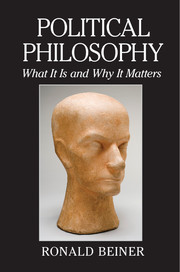Book contents
- Frontmatter
- Dedication
- Contents
- First Prologue: Horizons of Political Reflection
- Second Prologue: Freud, Weber, and Political Philosophy
- 1 Hannah Arendt: The Performativity of Politics
- 2 Michael Oakeshott: Life’s Adventure
- 3 Leo Strauss: The Politics of Philosophy
- 4 Karl Löwith: In Awe of the Cosmos
- 5 Excursus on Nature and History in the Strauss-Löwith Correspondence
- 6 Eric Voegelin: Modernity’s Vortex
- 7 Simone Weil: The Politics of the Soul
- 8 Hans-Georg Gadamer: Philosophy without Hubris
- 9 Jürgen Habermas: Politics as Rational Discourse
- 10 Michel Foucault’s Carceral Society
- 11 Alasdair MacIntyre: Fragmentation and Wholeness
- 12 Short Excursus on the Rise and Decline of Communitarianism as a Political Philosophy
- 13 John Rawls and the Death of Political Philosophy
- 14 Richard Rorty: Knocking Philosophy off Its Pedestal, or the Death of Political Philosophy Postmodernized
- Epilogue: On Not Throwing in the Towel
- Index
- References
4 - Karl Löwith: In Awe of the Cosmos
Published online by Cambridge University Press: 05 August 2014
- Frontmatter
- Dedication
- Contents
- First Prologue: Horizons of Political Reflection
- Second Prologue: Freud, Weber, and Political Philosophy
- 1 Hannah Arendt: The Performativity of Politics
- 2 Michael Oakeshott: Life’s Adventure
- 3 Leo Strauss: The Politics of Philosophy
- 4 Karl Löwith: In Awe of the Cosmos
- 5 Excursus on Nature and History in the Strauss-Löwith Correspondence
- 6 Eric Voegelin: Modernity’s Vortex
- 7 Simone Weil: The Politics of the Soul
- 8 Hans-Georg Gadamer: Philosophy without Hubris
- 9 Jürgen Habermas: Politics as Rational Discourse
- 10 Michel Foucault’s Carceral Society
- 11 Alasdair MacIntyre: Fragmentation and Wholeness
- 12 Short Excursus on the Rise and Decline of Communitarianism as a Political Philosophy
- 13 John Rawls and the Death of Political Philosophy
- 14 Richard Rorty: Knocking Philosophy off Its Pedestal, or the Death of Political Philosophy Postmodernized
- Epilogue: On Not Throwing in the Towel
- Index
- References
Summary
Of the twelve thinkers surveyed in this book, Karl Löwith has surely been the one whose subsequent influence on political philosophers has been the most modest. There is no Löwithian school and no shelf of books devoted to his thought and legacy. It would be fair to say that he, along with Gadamer, contributes the least to the formulation of immediate (or even remote) prescriptions for the organization of political life. Still, a strong case can be made that his thinking about fundamental issues of modern life is no less worthy of our attention than that of the other thinkers covered in this book; in particular, there is a tragic sensibility in Löwith that seems to capture a deep truth about the human condition. Moreover, his chosen themes continue to have a pre-eminent relevance in the social world we currently inhabit. The relationship between nature and humanity, and the urgent need for a renegotiation of that relationship, comes up in several of the other thinkers we discuss, but arguably it is Löwith who makes this issue central to his philosophical reflection to a greater extent than any of the others. To that extent, he surely deserves more recognition than he has yet received. In considering Löwith, it must be said that it is far from obvious exactly what follows for contemporary social and political life from the notion of a cosmos that Löwith wants somehow to resurrect. Still, it seems reasonable to expect (or at least to hope) that the more we are reminded of our species’ puniness in relation to nature – and it is certainly an important part of Löwith’s intellectual purpose to drive home this reminder – the more we will be forced to rein in our tendency to comport ourselves on this planet as if we were lords of the universe. (One should perhaps also make the countervailing point that the more we direct our gaze outwards toward the cosmos, the less it will seem to matter what kind of mess we human beings make on our own obscure planet.)
- Type
- Chapter
- Information
- Political PhilosophyWhat It Is and Why It Matters, pp. 63 - 79Publisher: Cambridge University PressPrint publication year: 2014
References
- 1
- Cited by



